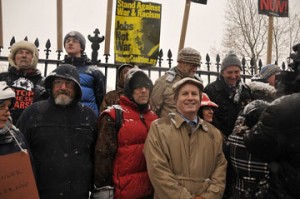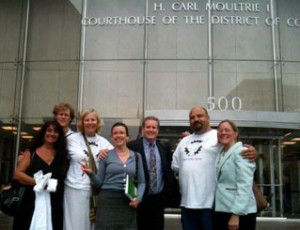By Kate Helm
Don’t expect to see attorney Mark Goldstone ’81 chained to the White House fence anytime soon. But do expect him to be standing side-by-side with prominent liberal activists, defending their rights to free speech and non-violent protest. He calls it his own way of contributing to political change.

Mark Goldstone ’81 (tan raincoat) with anti-war protestors Dec. 16 in Washington, D.C.; Daniel Ellsberg to his right. Photo by Ellen Davidson.
Goldstone is chief counsel for the 131 anti-war protesters arrested at the White House Dec. 16 in response to the long-awaited report from the Obama administration and the Pentagon on the escalation of the war in Afghanistan. He is representing Daniel Ellsberg, the 79-year-old former military analyst who leaked the “Pentagon Papers” to the New York Times in 1971. Ellsberg was among the protesters Thursday. Goldstone also has represented Lt. Dan Choi, a gay activist who has protested the military’s “Don’t Ask, Don’t Tell” policy, repealed Saturday by the U.S. Senate.
“Mark Goldstone is, in my opinion, one of the nation’s best advocates for free speech,” says Choi, an Iraq war veteran who was discharged from the Army National Guard after coming out on MSNBC.
For Goldstone, defending activists is all part of a very satisfying day’s work. After earning his J.D. degree from Temple University in 1984, he was a criminal defense lawyer in Washington, D.C. When more than 100 activists were arrested in 1985 for protesting President Ronald Reagan’s support of war in Central America, Goldstone was assigned to one of the cases. After all the other lawyers dropped their cases, Goldstone was assigned to all 100-plus defenses. He fell in love with defending activists.
“It allowed me to combine my political interests with my legal abilities,” he explains. “I like working with activists because of their knowledge and passion for their issues and their belief that through non-violent protest they can affect policy and change history.”

Mark Goldstone ’81 (center) and anti-war protestor Cindy Sheehan (white dress) with other members of Peace of the Action
Goldstone’s respect for protesters like Choi and Cindy Sheehan, an anti-war activist who has been protesting the wars in Iraq and Afghanistan since her oldest son was killed in Iraq, is mutual. Goldstone defended Sheehan in her first-ever victorious legal battle in July after spending 52 hours in jail and being ordered to stay away from the White House.
“I have learned a lot from Mark and my other attorneys who gallantly stepped up when I found myself in ‘trouble,’” she says. “Mark is one of the reasons I have found a deep respect for the legal profession.”
Though he has strong political opinions, Goldstone does not classify himself as an activist. Rather, he only defends protesters with whom he agrees politically. While he certainly unequivocally supports freedom of speech for those with whom he disagrees, he does not take on their cases.
“That is how I contribute my talents to the political process,” he says. “It allows me to use my legal training and experience to advance my clients’ political and organizational goals to advance positive social change and to work for peace and justice. While I do not agree with every statement, position, or action of my activist clients, my representation of them is certainly my expression of support for them and their goals. Non-violent protest is protected by the First Amendment and is one of our most important and enduring rights and values. I play a role in ensuring that freedom of speech is protected and defended in our nation’s capital, and that is very important to me.”
So far, it’s working, he says. According to Goldstone, “Don’t Ask, Don’t Tell” protesters have been told by White House officials that their efforts have expedited the repeal process of the controversial policy that prohibits openly gay men and women from serving in the military.
Foreign policy, human rights, and activism have interested Goldstone since his days on College Hill.
“Lafayette was very challenging and encouraged independent thought and dialogue and debate,” says Goldstone, who majored in international studies. “I was a liberal student activist at the time, and Lafayette was very accommodating to us and certainly respected our rights to free speech and open debate.”
From the man who now argues for the First Amendment on a much bigger hill, there is no greater compliment for his alma mater.


1 Comment
Comments are closed.